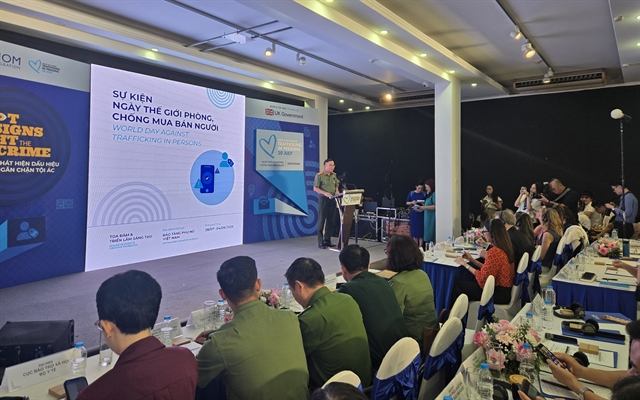 Politics & Law
Politics & Law


|
| Colonel Lê Hoàng Dương, Deputy Director of the Department of Foreign Affairs under the Ministry of Public Security, speaks at the event. — VNA/VNS Photo Xuân Tùng |
HÀ NỘI — Human trafficking has negative impacts on the economy and political security and also results in other violations, such as illegal immigration, illegal labour, prostitution, drug trafficking and especially fraud in cyberspace.
That's according to Colonel Lê Hoàng Dương, Deputy Director of the Department of Foreign Affairs under the Ministry of Public Security (MPS), who made the statement at a seminar on Monday in Hà Nội themed 'Connecting Actions: Leaving No One Behind in Human Trafficking Prevention and Control'.
The seminar was held by the International Organisation for Migration (IOM) in Việt Nam in conjunction with the MPS ahead of the World Day against Trafficking in Persons and National Day against Trafficking in Persons, both on July 30.
It was aimed at raising public awareness about new trends in human trafficking to strengthen the capacity of law enforcement agencies, enhance international cooperation, leverage technology to identify and dismantle human trafficking rings and ensure victims’ voices are put at the centre.
Colonel Dương believes that human trafficking prevention and control must be conducted diversely and practically, so that it works well for everyone.
All citizens must also be educated about the criminal tricks and consequences for victims, as well as for society, Dương said.
The consistent position of the Vietnamese Party and State is to recognise, protect and ensure human rights, especially for women and children.
A national programme on human trafficking prevention and control has called for the participation of the entire political system and the people.
Prevention is the main focus of all efforts to combat human trafficking.
The Law on Human Trafficking Prevention and Combat 2024, effective as of July 1 this year, introduces important principles to meet practical requirements, in accordance with international treaties that Việt Nam has signed.
In particular, the principle of placing the victim at the centre of the effort expands the scope of protection and provides support for victims.
Acting Chief of Mission for IOM in Việt Nam Mitsue Pembroke said she appreciates Việt Nam's actions to promote effective and safe migration and combat human trafficking, especially the Government's efforts in amending the Law on Prevention and Combating Human Trafficking 2024.
She said that it demonstrates Việt Nam's strong commitment to combating the crime. The amended law lays a stronger foundation to address the increasingly complex trends in human trafficking, which are being further complicated by socio-economic challenges.
Việt Nam has more than 22 million young people aged 16-30, many of whom have considered leaving their homeland for better work and education opportunities.
Pembroke said that although young workers are increasingly vulnerable to online trafficking, they are also a force that can create change.
United Nations Resident Coordinator in Việt Nam Pauline Tamesis said that young people's creativity, energy and technological mastery enabled them to develop new solutions to prevent and combat human trafficking in the digital age.
“Investing in the young generation will therefore encourage them to take action to protect their peers and fully exploit their potential to build a more resilient community.
"Việt Nam is preparing to host the signing ceremony of the Hanoi Convention – the first global treaty to address cybercrime, marking a milestone in international cooperation to combat crimes using technology, including human trafficking," Tamesis said.
Human trafficking crimes in the Asia-Pacific region have become more and more complicated in recent years, according to reports.
Since the COVID-19 pandemic, Southeast Asia has witnessed an explosion of fraud bases, where transnational criminal organisations operate complex online fraud activities.
According to IOM Southeast Asia's 'Trafficking in Persons Report', the number of trafficking cases receiving IOM support in the region has more than tripled, from 296 in 2022 to 978 in 2023.
Victims are often young and educated people who are tricked into recruitment with promises of attractive jobs, but then have their identity documents confiscated before being detained, beaten, abused and forced to commit fraud.
These types of crimes include scams involving fake investments, cryptocurrency, romance or sex, as well as impersonation scams, in which perpetrators build trust with victims over a long period before defrauding them of large sums of money.
At the seminar, delegates emphasised that young people play a key role as agents of change in the fight against human trafficking. — VNS